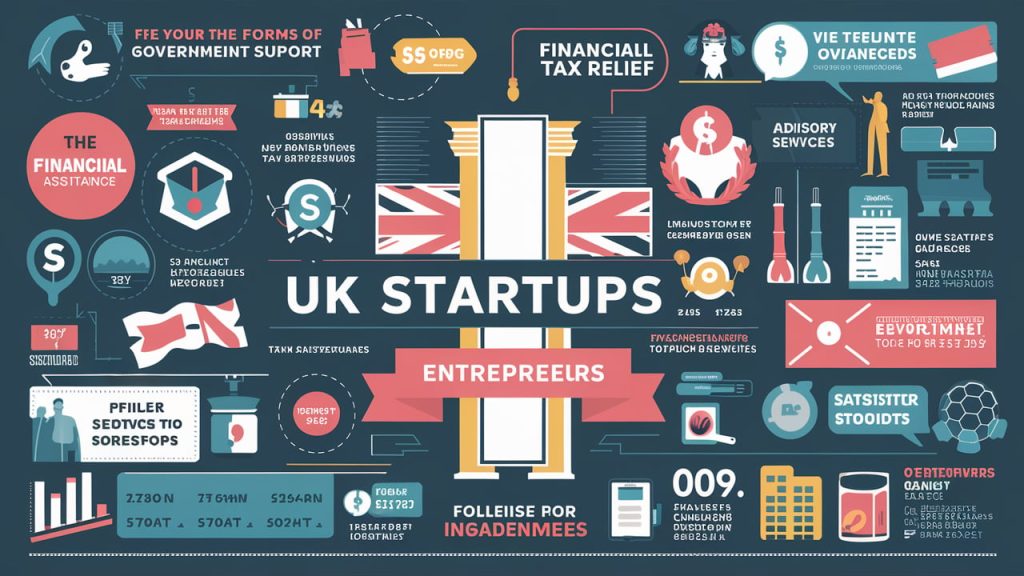The United Kingdom has emerged as a global powerhouse in the startup world, cementing its position as the second-largest startup ecosystem behind the United States. With a thriving tech scene, a robust talent pool, and a supportive government, the UK is attracting investors and entrepreneurs from around the world. In this article, we’ll explore the key factors that contribute to the success of the UK startups and highlight some of the notable startups and trends shaping the future of innovation in the country.
The Rise of the UK Startups
The UK startup ecosystem has been on an upward trajectory in recent years, with a steady increase in funding, talent, and success stories. In 2023, UK startups raised a record $6.7 billion in funding during the first half of the year, surpassing China and solidifying the UK’s position as the world’s second-largest startup ecosystem.This growth can be attributed to several factors, including:
- Supportive Government Policies: The UK government has implemented various initiatives to support startups, such as the Enterprise Investment Scheme (EIS) and the Seed Enterprise Investment Scheme (SEIS), which provide tax incentives for investors.
- Access to Talent: The UK boasts a highly skilled workforce, with top universities and a thriving tech community that attracts talent from around the world.
- Robust Funding Ecosystem: The UK has a well-developed venture capital and angel investor community, with a growing number of accelerators and incubators supporting startups at various stages of growth.
Notable UK Startup Hubs
While London remains the dominant startup hub in the UK, accounting for a significant portion of the country’s startup activity, other cities are also emerging as thriving ecosystems. Notable examples include:
- Glasgow: Glasgow startups raised a record $224 million in venture capital funding in 2023, with strong growth in the healthtech sector.
- Belfast: Belfast saw the second-best year on record for venture capital investment in 2023, with notable funding rounds in the electric vehicle and fintech sectors.
- Bristol: Bristol has seen a notable increase in the size of funding rounds in recent years, with strong growth in sectors such as fintech, energy, and transportation.
Successful UK Startups
The UK startups has produced several success stories, with a growing number of unicorns (startups valued at over $1 billion) and exits. Notable examples include:
- Monzo: A digital bank that has raised over $1 billion in funding and has over 5 million customers.
- Abound: A fintech startup that provides lending services to small businesses and has raised over $100 million in funding.
- Wayve: An autonomous vehicle startup that raised a $1.05 billion funding round in 2024, one of the largest funding rounds ever for a UK startup.

Top 5 benefits to avail as a UK Startup Founder
Financial Incentives: Many governments offer financial incentives, such as tax breaks, grants, and loans specifically for startups. These can significantly reduce your initial financial burden.
Access to Resources: Startups often have access to a range of resources, including incubators, accelerators, and coworking spaces, which provide mentoring, networking opportunities, and office space at reduced costs.
Flexibility and Innovation: As a startup, you have the flexibility to pivot quickly, explore new ideas, and innovate without the constraints often found in larger companies. This agility allows you to respond to market changes effectively.
Networking Opportunities: Being part of the startup community gives you access to a vast network of entrepreneurs, investors, and mentors who can offer valuable advice, funding, and partnerships.
Skill Development: Running a startup provides a steep learning curve, helping you develop a diverse skill set, from marketing and sales to product development and leadership, which is invaluable for your personal and professional growth.
Challenges and Opportunities
While the UK startup ecosystem is thriving, it also faces several challenges, such as the impact of Brexit on access to talent and funding, and the need to diversify beyond London. However, these challenges also present opportunities for innovation and growth, as UK startups adapt to the changing landscape and explore new markets and technologies.
Financial Support for UK Startups
One of the most significant ways the UK government supports startups is through financial assistance. Various grants, loans, and funding schemes are designed to alleviate the financial burden on new businesses. For instance, Innovate UK offers grants for research and development (R&D) projects, enabling UK startups to innovate without the pressure of immediate financial returns. This funding not only helps businesses develop new products but also enhances their competitiveness in the market.Another notable initiative is the Start-Up Loans Scheme, which provides low-interest loans to entrepreneurs looking to launch their businesses. This scheme offers loans ranging from £500 to £25,000, along with mentoring support to guide new business owners through the early stages of their ventures. Tax Relief and Incentives
The UK government also offers tax relief schemes to encourage investment in startups. The Enterprise Investment Scheme (EIS) and the Seed Enterprise Investment Scheme (SEIS) are two key programs that provide tax incentives for investors who support early-stage companies. These schemes allow investors to claim significant tax relief on their investments, making it more attractive to fund startups. This, in turn, helps startups secure the necessary capital to grow and scale their operations.
Advisory Services and Resources
In addition to financial support, the UK government provides a wealth of advisory services and resources to help startups navigate the complexities of launching and running a business. The Business Support Helpline offers free advice on various aspects of starting and managing a business, including funding options, regulations, and best practices. Entrepreneurs can access tailored guidance to help them make informed decisions and avoid common pitfalls.Furthermore, the GOV.UK Business Finance and Support Finder is an interactive tool that allows startups to search for government-backed support and finance based on their specific needs. This resource helps entrepreneurs identify the most relevant funding opportunities and support programs available in their region.
Local Growth Hubs
The UK government has established Growth Hubs across the country, providing localized support for startups and small businesses. These hubs connect entrepreneurs with local resources, funding opportunities, and expert advice tailored to their specific regions. By fostering collaboration between businesses, local authorities, and educational institutions, Growth Hubs create a supportive ecosystem that encourages innovation and economic growth.
Conclusion
The UK startup ecosystem is a testament to the power of innovation, talent, and supportive policies. With a growing number of success stories and a thriving tech community, the UK is well-positioned to continue its rise as a global leader in startup innovation. As the ecosystem evolves, it will be important for startups, investors, and policymakers to work together to address challenges and seize new opportunities for growth.
Also Read Australia Startup Ecosystem
Government Resource Visa option for UK Startups














